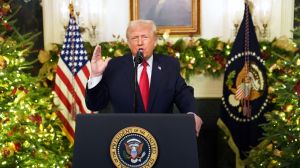145;Not chasm, J-K a bridge between India and Pakistan146;
Dispelling political concerns all around and overcoming many procedural difficulties, a rare conversation among Indians, Pakistanis and Kash...

Dispelling political concerns all around and overcoming many procedural difficulties, a rare conversation among Indians, Pakistanis and Kashmiris ended here today with the hope that the state of Jammu and Kashmir could eventually become a bridge between New Delhi and Islamabad.
As the Pugwash Conference on Science and World Affairs, winner of the 1995 Nobel Peace Prize, prepared to host a dialogue on Jammu and Kashmir, there was considerable anxiety in New Delhi about its unusual format and potentially unwelcome consequences.
Despite those apprehensions, New Delhi decided to allow leaders of the All Party Hurriyat Conference to travel to Kathmandu in their individual capacity. Many of them, including Mir waiz Omar Farooq, Abdul Ghani Bhatt and Sajjad Lone joined the unprecedented dialogue.
Although the Indian government let Syed Ali Geelani travel and participate in the conference, the hardline leader of the Jamat-e-Islami in Kashmir was a no-show.
New Delhi8217;s calculated risk appears to have been worthwhile as the engagement between Indians, Pakistanis and Kashmiris took place amid rhetorical restraint, political civility and mutual respect.
No one at the conference ceded ground on the controversial question of Jammu and Kashmir. Yet, no one sought to impose a set of positions on the others. The emphasis was on the widely shared interest in promoting peace and development in Jammu and Kashmir.
The conference over the last four days saw two sets of conversations. One among Indians, Pakistanis and Kashmiri leaders; and another, taking place for the first time, just between the conference participants from Jammu and Kashmir across the dividing line.
Summing up the essence of the dialogue in a press release, Paolo Cotta-Ramusino, Secretary General of the Pugwash, underlined the vision that 8220;Jammu and Kashmir need not forever represent a chasm dividing India and Pakistan, but could potentially be a bridge between these two great countries8221;.
A separate statement from the leaders of J-K reflected the consensus among them that the solutions to the problem in the state must be 8220;sought in a peaceful manner8221;, 8220;perceived as honourable8221;, and must be 8220;feasible8221;. No one from New Delhi, Islamabad, Srinagar or Muzaffarabad would want to quibble with those political criteria for a settlement of the Jammu and Kashmir question.
A running theme in both the conversations was the urgency of initiating measures to reduce the levels of violence, enhance the rule of law, and generate greater contact and economic exchanges between the people of the divided state.
Trading charges and apportioning the blame for the extended crisis in Jammu and Kashmir are common in any dialogue between Indians and Pakistanis. The focus at Kathmandu, instead, was on finding common ground despite major differences between Indians, Pakistanis and Kashmiris and among the various regions of the original state of Jammu and Kashmir.
The conference did not come up with any solutions to the Jammu and Kashmir problem. It was not expected to. If sustained, however, the initiative might help generate a wee bit of political space for New Delhi and Islamabad to explore answers to the problem.
- 01
- 02
- 03
- 04
- 05































